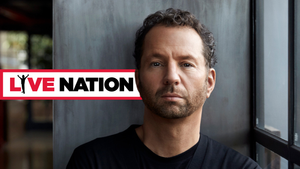With concert ticket pricing and Ticketmaster very much in the news in the UK this month in the context of the Oasis reunion shows, Live Nation boss Michael Rapino has insisted that live music is still an “incredibly affordable” option when compared to other forms of live entertainment. Meanwhile, the live giant’s ticketing business mainly gets a bad rep, he reckons, because with in-demand shows you have lots of disappointed fans who can’t get tickets.
Rapino was talking at a Goldman Sachs conference in the US. While high ticket prices for shows by the biggest music stars “make headlines”, he said, live music is “still the most affordable opportunity out there”. On average, “75% of tickets are under $100”, and with most shows “half of tickets are under $50”.
And even with the tickets that sell for much more, he added, it’s still a good deal when compared to sports. Admitting his company has never quite managed to “figure out this PR struggle”, he said in sport it’s “like a badge of honour to say that the court sides were $7000”. Whereas in music, “you're horrible if you charge $800 for a front row concert”.
Live music is an “incredibly affordable opportunity in the big picture”, he went on. “You can stack it up to sports, theatre, a good night out at a restaurant, concerts are always going to be much more bang for your buck”.
A key theme of Rapino’s interview was that the live music sector is in a great place right now. “This will be an industry that we should look at to have continual global growth on an annual basis”, Rapino said. And yet, we know in many markets it’s the upper-end of the sector that is booming, while artists, venues and promoters at the grassroots - and in some cases even in the mid tier - are struggling.
Which makes you wonder how much of that growth will come from ever higher prices at the arena and stadium level. Rapino’s comparison with pricing in sport - and the fact that shows still sell out even when Ticketmaster’s dynamic pricing system results in much higher prices - suggests there is still room for further price increases without negatively impacting demand.
Although some artists will be concerned about the potential backlash to ever higher pricing and the bad press dynamic pricing has been receiving. Plus, with concerts, it’s arguably important to get the most passionate fans, rather than those with the most money, down the front, which possibly puts a cap on what you can charge for front row tickets.
Which is why, in music, VIP packages have a particularly important role to play, where those with more cash get enhanced experiences at a premium without necessarily sitting in the front row. Rapino agrees, stating that better VIP products is “our most obvious biggest opportunity”.
That involves investing in the venues that Live Nation owns and/or operates, he added. It’s not enough for venues to have some corporate suites sold to big companies, there needs to be more variety and flexibility around premium offerings.
Rapino talked about the Live Nation-operated Jones Beach amphitheater in New York state. “Jones Beach would be the first example where we said, if we took our venue, which is average about 9% premium, we can get to 30% premium”, he explained.
The venue went from “crappy VIP to multiple VIP, multiple premium areas” with “upgraded food and beverage, and you’ve got the fanbase already coming”.
Needless to say, Rapino didn’t get into the allegations of anticompetitive conduct made against his company, including in the US Department Of Justice’s big lawsuit that seeks to split up Live Nation and Ticketmaster.
However, he did insist that promoters and venues use Ticketmaster because of all its brilliant tools, and not - as critics claim - because they are forced into doing so by Live Nation’s anticompetitive behaviour.
As for the consumer hate Ticketmaster is routinely on the receiving end of, that’s because, when fans fail to secure tickets for in-demand shows, they will generally hate the ticket seller.
“In today’s world, consumers are never happy when they can’t get a ticket”, he said. “They might not have known before when they waited in lines, but today, the internet, you quickly know when you’re trying to serve 500,000 tickets to 10 million people, you wake up with 9.5 million that don't like you instantly”.
And if you can think of any other reasons for disliking Ticketmaster, I suppose you must be imagining them.

